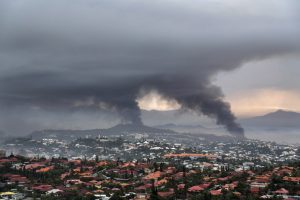New Caledonia, France’s Pacific island territory, remains under a state of emergency as deadly riots continue to grip the country. Here’s a quick primer on the crisis.
How Serious Are the Riots?
New Caledonia is experiencing a wave of violence on a scale not seen since the terrible events of the 1980s — a period of near civil-war between supporters and opponents of independence that ended with landmark political accords in 1988 and 1998.
In rioting involving up to 9,000 people, there has been large-scale destruction and looting of public infrastructure and businesses across the capital, Nouméa. Large parts of the city and key roads are cut off by barricades. The damage thus far has been estimated at 200 million euro.
As of midday on May 17, there have been five reported deaths. Two of the dead are gendarmes who were shot (one from an accidental gunshot).
The other three are indigenous Kanak people (two men aged 20 and 36 and a woman aged 17) who are believed to have been shot in two separate incidents, probably by local residents who have armed themselves to defend their neighborhoods. France’s government has taken the extraordinary measure of declaring a state of emergency, which took effect early on May 16 and will remain in place for at least 12 days. International flights in and out of the country are suspended, and curfews in place.
At least 1,000 gendarmes and police have been deployed, with more soon to arrive, and the French Army has been called on to secure key strategic points.
How Did the Riots Begin?
The immediate catalyst for this crisis is a proposed change to New Caledonia’s provincial electoral rolls.
In Paris on May 15, France’s National Assembly endorsed a proposed new constitutional law that would allow French residents who have lived in New Caledonia for a decade the right to vote in provincial elections.
The proposed change would add up to 25,000 voters to New Caledonia’s local electoral rolls. It would do this by overturning a 2007 measure enshrined in France’s constitution that “froze” New Caledonia’s provincial electoral rolls to allow only French citizens who were admitted to vote in the 1998 elections (with some narrow exceptions) and their adult descendants to participate in the elections that determine local political policy and the composition of the country’s Congress.
By profoundly modifying the electorate without reaching a local political consensus, the reform would reverse a key element of the 1998 Nouméa Accord, which has guaranteed civil peace for more than 25 years and made possible a process of decolonization.
Some New Caledonians fear the proposed change — which now requires ratification by a two-thirds majority of the Congress of Versailles — would dilute the share of the vote held by the Kanak people.
The Kanak people have long resented French rule. They say allowing French immigrants to vote would hamper New Caledonia’s chances of gaining independence.
What’s the Backstory Here?
The root cause of the current crisis, however, is the French government’s failure in 2021 to create the conditions for a third independence referendum that would be beyond all moral and political reproach.
The 1998 Nouméa Accord provided for up to three referenda on independence. In the second referendum in 2020, the vote in favor of independence was a very significant 47 percent — up 4 points on the first referendum in 2018. The strength of the vote for independence came as a great surprise to French authorities and local “loyalist” parties.
A third referendum took place in 2021 under highly contested conditions in the midst of the COVID-19 pandemic. That timing was strongly protested by the independence movement, which then called for a boycott. That boycott was massively supported and not just by independentists: the abstention rate was 56 percent. Of those who did vote, 96 percent voted to remain with France.
While the 2021 referendum was technically legal, it has been deemed to be morally and politically flawed, in that the majority of voters, including the majority of indigenous Kanak and independentists, did not participate.
France’s government and “loyalist” parties, though, have steadfastly refused to concede that there was anything wrong with the conditions governing the third referendum.
They argue that New Caledonians have voted three times to remain with France; that the 1998 Nouméa Accord is no longer fit for purpose; and that many of its provisions, including the electoral restriction, need to be reformed.
The pro-independence view, broadly, is that there can be no reforms until the issue of the third referendum is resolved.
Pro-independence groups are open to reaching an agreement on electoral reform in the future, but they want that to be part of a wider accord or agreement that includes a pathway to a further referendum and a continuation of the decolonization process, which in their view has not ended.
In the short term, they are calling on French authorities for a dialogue mission and for sufficient time for negotiations to take place in good faith without the threat of an imposed constitutional change.
Originally published under Creative Commons by 360info™.

































